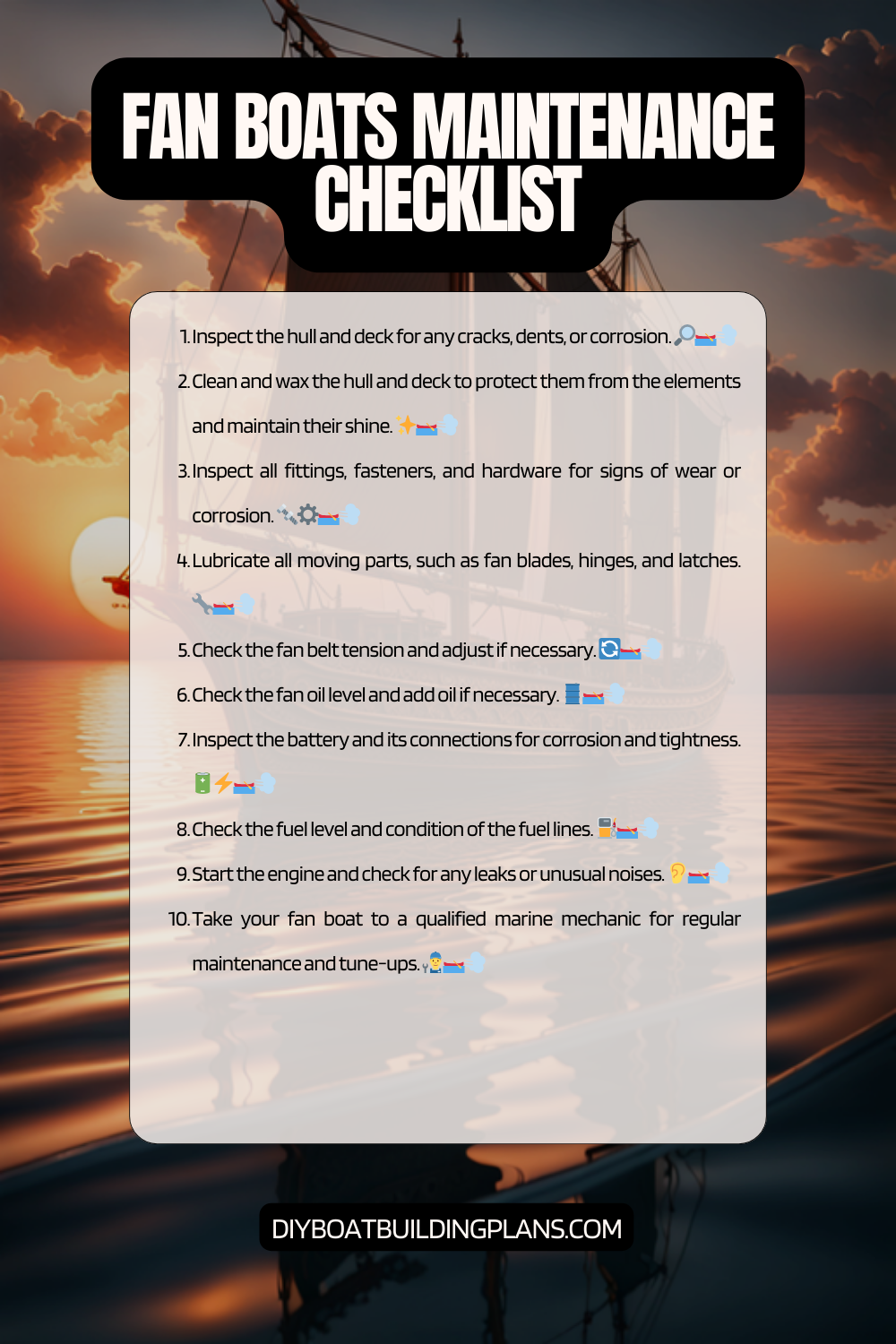Overview of Fan Boat Maintenance Tips
Fan boats, also known as airboats, are unique watercraft that are propelled by a large fan or propeller at the back of the boat. These boats are commonly used in marshy or shallow waters, where traditional propeller-driven boats may struggle to navigate. Due to their design and usage in challenging environments, fan boats require specific maintenance to ensure optimal performance and longevity.
Key Takeaways
- Regular maintenance is crucial for the longevity and performance of your fan boat.
- Before starting maintenance, gather all necessary tools and supplies.
- Cleaning the hull and deck, checking the engine and propeller, lubricating moving parts, and inspecting electrical components are all important maintenance tasks.
- Maintaining the cooling system and winterizing your fan boat are also essential for proper upkeep.
- Troubleshooting common issues can help prevent bigger problems down the line.

Importance of Regular Maintenance
Regular maintenance is crucial for fan boats to ensure they operate at their best. By performing routine maintenance tasks, you can improve the overall performance of your boat and extend its lifespan. Neglecting maintenance can lead to a range of issues, including breakdowns and costly repairs.
One of the key benefits of regular maintenance is improved performance. By keeping your fan boat in top condition, you can maximize its speed and maneuverability. Regular maintenance also helps prevent wear and tear on various components, ensuring they function smoothly and efficiently.
Furthermore, regular maintenance can save you money in the long run. By identifying and addressing potential issues early on, you can prevent them from escalating into major problems that require expensive repairs. Additionally, well-maintained fan boats tend to have a higher resale value, making it a worthwhile investment.
Preparing for Maintenance
Before diving into the maintenance tasks, it’s important to prepare your fan boat properly. Start by gathering all the necessary tools and supplies you’ll need for the job. This may include items such as cleaning solutions, brushes, lubricants, and a variety of wrenches or screwdrivers.
Next, ensure that you have a safe and well-ventilated workspace for performing the maintenance tasks. It’s essential to work in an area where you have enough room to move around comfortably and access all parts of the boat easily.
Finally, make sure you have a detailed understanding of your fan boat’s manual or consult with an expert if needed. Familiarize yourself with the specific maintenance requirements and recommendations for your particular model. This will help you perform the tasks correctly and avoid any potential mistakes.
Cleaning the Hull and Deck
| Task | Frequency | Time Required | Tools Required |
| Cleaning the Hull | Weekly | 1-2 hours | Soft-bristled brush, bucket, soap, water hose |
| Cleaning the Deck | Weekly | 1-2 hours | Broom, bucket, soap, water hose |
| Polishing the Hull | Monthly | 2-3 hours | Polishing compound, buffer, soft cloth |
| Waxing the Deck | Quarterly | 3-4 hours | Deck wax, applicator, soft cloth |
Cleaning the hull and deck of your fan boat is an essential part of maintenance. Over time, these areas can accumulate dirt, grime, and even stubborn stains. Cleaning them regularly not only improves the appearance of your boat but also helps prevent corrosion and damage.
To clean the hull and deck, start by rinsing off any loose debris with a hose or pressure washer. This will help remove dirt and mud that may have accumulated during your previous outings. Next, use a mild detergent or boat cleaner to scrub the surfaces with a soft brush or sponge. Pay special attention to areas with stains or stubborn dirt, using a more abrasive cleaner if necessary.
After cleaning, rinse off the soap thoroughly to avoid leaving any residue behind. Finally, dry the hull and deck completely to prevent water spots or mold growth. Regular cleaning of these areas will not only keep your fan boat looking its best but also protect it from potential damage caused by dirt and grime buildup.
Checking the Engine and Propeller
The engine and propeller are vital components of your fan boat, and regular inspection is crucial to ensure their proper functioning. Start by visually inspecting the engine for any signs of leaks, loose connections, or damaged parts. Check the fuel lines, oil levels, and coolant levels to ensure they are within the recommended range.
Next, move on to inspecting the propeller. Look for any signs of damage, such as bent blades or dents. Ensure that the propeller is securely attached to the shaft and that there is no excessive play or wobbling. If you notice any issues during your inspection, it’s important to address them promptly to prevent further damage or potential accidents.
In addition to visual inspection, it’s also recommended to perform regular maintenance tasks on the engine and propeller. This may include changing the oil, replacing filters, and greasing moving parts. Consult your fan boat’s manual or seek professional advice to ensure you are following the correct procedures for your specific model.
Lubricating Moving Parts
Lubrication is essential for maintaining the smooth operation of various moving parts in your fan boat. Without proper lubrication, these components can experience increased friction, leading to wear and potential damage over time.
Start by identifying the moving parts that require lubrication, such as the steering system, throttle cables, and any other mechanisms that involve metal-to-metal contact. Use a suitable lubricant recommended by your boat’s manufacturer and apply it according to the instructions provided.
When lubricating the steering system, pay attention to the steering cables and joints. Apply lubricant to these areas to ensure smooth and responsive steering. Similarly, lubricate the throttle cables to prevent them from becoming stiff or sticking.
Regularly inspecting and lubricating these moving parts will help maintain their functionality and prevent premature wear. It’s important to follow the recommended lubrication intervals provided by your boat’s manufacturer to ensure optimal performance.
Inspecting Electrical Components
The electrical components of your fan boat play a crucial role in its operation, and regular inspection is necessary to identify any potential issues. Start by checking the battery for signs of corrosion or damage. Clean the battery terminals if necessary and ensure they are securely connected.
Next, inspect the wiring throughout your boat, paying attention to any signs of fraying or loose connections. Check all electrical connections, including those for lights, navigation systems, and any other accessories you may have installed.
If you notice any issues during your inspection, such as loose connections or damaged wiring, it’s important to address them promptly. Faulty electrical components can lead to malfunctions or even pose a safety risk. Consider consulting with an expert if you are unsure about any electrical repairs or replacements.
Maintaining the Cooling System
The cooling system is a critical component of your fan boat, as it helps regulate the engine’s temperature and prevent overheating. Regular maintenance of the cooling system is essential to ensure its proper functioning and prevent potential damage to the engine.
Start by inspecting the coolant levels and ensuring they are within the recommended range. If necessary, top up the coolant using the appropriate type and mixture recommended by your boat’s manufacturer. It’s important to use the correct coolant to prevent any compatibility issues or damage to the cooling system.
Next, visually inspect the cooling system for any signs of leaks, cracks, or damaged hoses. Check all connections and clamps to ensure they are secure. If you notice any issues, such as leaks or damaged components, it’s crucial to address them promptly to prevent further damage or engine overheating.
Regularly flushing the cooling system is also recommended to remove any debris or sediment that may have accumulated over time. Consult your boat’s manual or seek professional advice to ensure you are following the correct procedures for flushing and maintaining your specific cooling system.
Winterizing Your Fan Boat
If you live in an area with cold winters or plan to store your fan boat for an extended period, winterizing is essential to protect it from potential damage. Winterizing involves a series of tasks aimed at preparing your boat for storage during the off-season.
Start by thoroughly cleaning your fan boat, including the hull, deck, and all components. This will help remove any dirt or grime that may contribute to corrosion during storage. Once cleaned, apply a protective wax or coating to the hull and deck to provide an additional layer of protection against moisture and UV rays.
Next, drain all fluids from your boat, including fuel, oil, and coolant. This helps prevent any potential damage caused by freezing temperatures. Consult your boat’s manual or seek professional advice to ensure you are following the correct procedures for draining fluids.
Additionally, it’s important to remove the battery and store it in a cool, dry place. This helps prevent the battery from freezing or losing its charge during the winter months. Consider using a battery maintainer or trickle charger to keep the battery in optimal condition.
Download over 500 Boat Plans. Click on the link below.
-->Click Here<--
Troubleshooting Common Issues
Despite regular maintenance, fan boat owners may encounter common issues from time to time. Being able to troubleshoot and address these issues promptly can help prevent further damage and ensure your boat remains in good working condition.
One common issue is a loss of power or reduced performance. This can be caused by various factors, such as a clogged intake or exhaust system, a dirty propeller, or a malfunctioning engine component. Start by visually inspecting these areas and cleaning or replacing any components as necessary.
Another common issue is overheating. This can be caused by a malfunctioning cooling system, low coolant levels, or a blocked water intake. Inspect the cooling system and ensure all components are functioning properly. Check the coolant levels and top up if necessary. Clear any debris or obstructions from the water intake to ensure proper water flow.
Electrical issues, such as a dead battery or malfunctioning lights, can also occur. Start by checking the battery connections and ensuring they are secure. Test the battery voltage using a multimeter to determine if it needs charging or replacement. If you are experiencing issues with lights or other electrical components, inspect the wiring for any loose connections or damaged wires.
If you encounter any issues that you are unable to resolve on your own, it’s recommended to seek professional assistance. A qualified technician will have the expertise and tools necessary to diagnose and repair more complex problems.
Fan Boat Maintenance Checklist

Conclusion – Fan Boat Maintenance Tips
In conclusion, regular maintenance is essential for fan boats to ensure optimal performance and longevity. By following the tips and recommendations outlined in this article, you can keep your fan boat in top condition and prevent potential issues.
Remember to prepare properly before starting any maintenance tasks, gathering the necessary tools and supplies. Cleaning the hull and deck regularly will not only improve the appearance of your boat but also protect it from potential damage caused by dirt and grime buildup.
Inspecting and maintaining the engine, propeller, electrical components, cooling system, and other moving parts are crucial for ensuring their proper functioning. Regular lubrication of moving parts helps reduce friction and prevent premature wear.
Winterizing your fan boat is essential if you plan to store it during the off-season. By following the correct procedures for winterization, you can protect your boat from potential damage caused by freezing temperatures.
Finally, being able to troubleshoot common issues and address them promptly will help keep your fan boat in good working condition. If you encounter any complex problems, it’s recommended to seek professional assistance.
By prioritizing regular maintenance and following these tips, you can enjoy many years of smooth sailing with your fan boat.
FAQs – Fan Boat Maintenance Tips
What is a fan boat?
A fan boat, also known as an airboat, is a type of watercraft that is propelled by an aircraft or automotive engine that drives a large fan or propeller.
Why is fan boat maintenance important?
Fan boat maintenance is important to ensure the safety and longevity of the watercraft. Regular maintenance can prevent breakdowns and costly repairs, as well as ensure that the boat is operating at peak performance.
What are some basic fan boat maintenance tips?
Some basic fan boat maintenance tips include checking the oil and fluid levels, inspecting the fan and propeller for damage, cleaning the air filter, and checking the battery and electrical system.
How often should fan boat maintenance be performed?
Fan boat maintenance should be performed regularly, with some tasks needing to be done before and after each use, while others can be done on a monthly or yearly basis. Consult the owner’s manual for specific maintenance schedules.
What are some common fan boat problems?
Common fan boat problems include engine overheating, propeller damage, electrical issues, and hull damage. Regular maintenance can help prevent these problems from occurring.
Can fan boat maintenance be done by the owner?
Yes, many fan boat maintenance tasks can be done by the owner, such as checking fluid levels and cleaning the air filter. However, more complex tasks may require the assistance of a professional mechanic.



